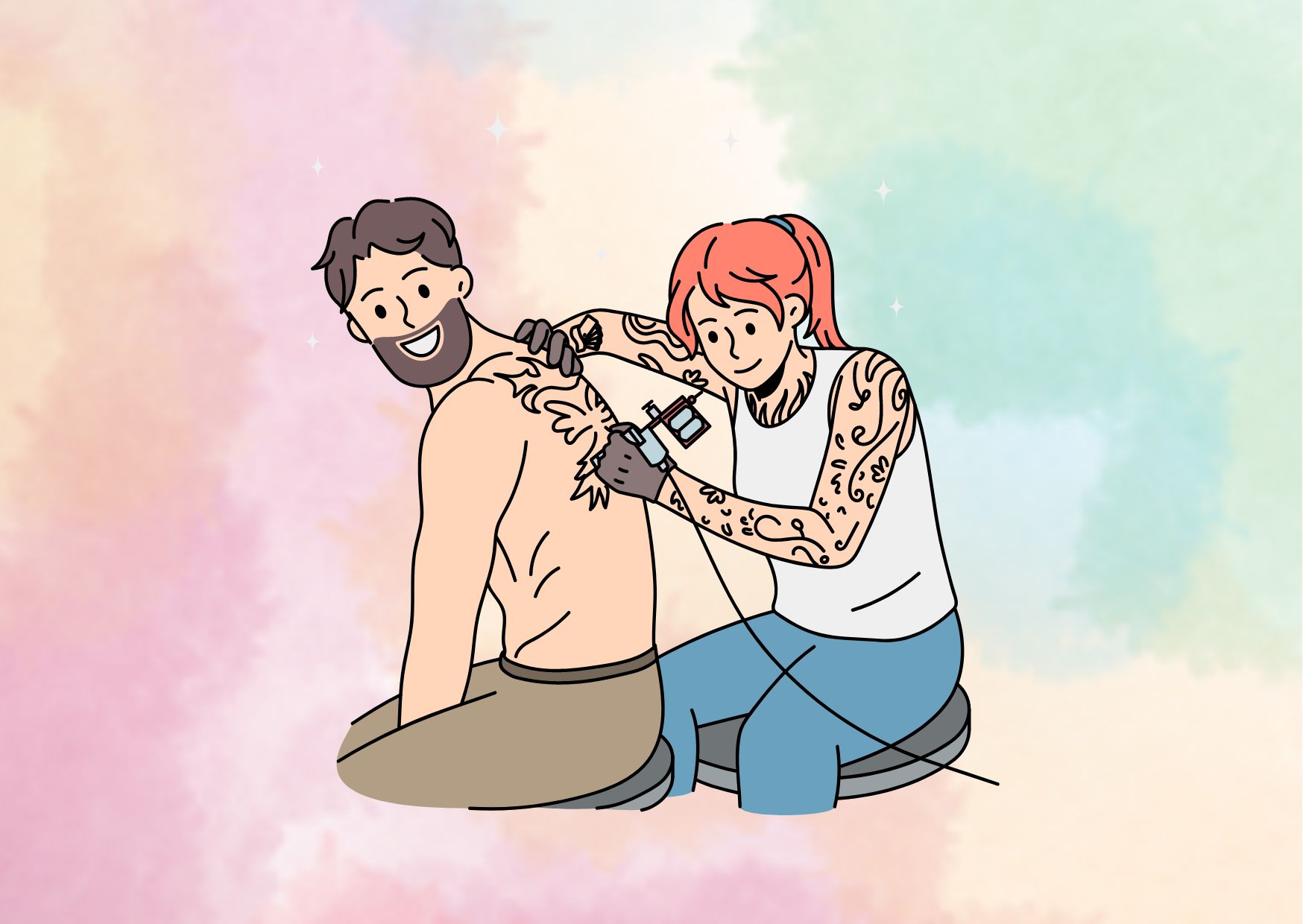Personality Traits and Tattoos
Research has shed light on the potential links between personality traits and the propensity for getting tattoos. A study by Tate and Shelton found that tattooed individuals scored significantly higher on the extraversion scale compared to non-tattooed individuals. However, there were no significant differences between the two groups in terms of conscientiousness or neuroticism.
- The higher extraversion scores for tattooed individuals suggest they may display higher levels of task performance and proactivity in the workplace.
- The study was limited by having a higher proportion of female participants compared to male participants, and future research should examine a more age-diverse sample.
- Examining the other two Big Five personality traits (agreeableness and openness to experience) could provide additional insights into the relationship between tattoos and personality.
Other studies have found that people with tattoos tend to score higher on extraversion, experience seeking, and need for uniqueness compared to non-tattooed individuals. Tattoos can be a way for people to express their uniqueness and individuality, and the choice of tattoo design, size, and placement can reveal aspects of the person’s personality.
| Personality Trait |
Correlation with Tattoos |
| Neuroticism |
Negatively correlated with extent of tattooed skin area |
| Openness |
Positively correlated with tattoo size |
Furthermore, tattoos can express a person’s strong ‘sense of self’ and individuality, as well as their risk-taking and thrill-seeking tendencies. The placement of a tattoo can provide insights into a person’s personality, such as boldness, free-spiritedness, confidence, or shyness.
While tattoos can provide clues about a person’s personality, they do not fundamentally change or define who a person is, as personality traits precede the decision to get tattoos. Individuals who are more open to new experiences and have a higher tolerance for risk are more likely to get tattoos, but there is no single ‘personality type’ that encompasses all people who get tattoos.
Tattoos and Self-Harm
The relationship between tattoos and self-harm is a complex and multifaceted one. While tattoos can serve as a form of self-expression and personal adornment, some individuals may view them as a “therapeutic substitute” for self-injurious behaviors. Here are some key points to consider:
- For individuals who struggle with self-harm, the act of getting a tattoo can provide a sense of control and ownership over their bodies. The pain associated with tattooing can be a way to release emotional tension or cope with difficult emotions, potentially serving as a safer alternative to more destructive forms of self-injury.
- However, it’s important to note that tattooing itself can be a form of self-harm for some individuals, particularly if the motivation is rooted in low self-esteem, self-punishment, or a desire to inflict pain or scarring.
- On the other hand, tattoos can also have positive impacts on self-esteem and body image. For some individuals, the process of getting a tattoo can be empowering, allowing them to reclaim control over their bodies and express their identities in a meaningful way.
| Potential Impact |
Description |
| Therapeutic Substitute |
Tattooing can provide a sense of control and release emotional tension, potentially serving as a safer alternative to self-harm. |
| Self-Harm Behavior |
For some individuals, the motivation behind tattooing may be rooted in low self-esteem, self-punishment, or a desire to inflict pain or scarring. |
| Positive Impact |
The process of getting a tattoo can be empowering, allowing individuals to reclaim control over their bodies and express their identities in a meaningful way, potentially boosting self-esteem and body image. |
It’s crucial to approach the topic of tattoos and self-harm with sensitivity and understanding, as the motivations and experiences can vary greatly from person to person. Professional support and guidance may be necessary for individuals struggling with self-harm or related mental health concerns.
Tattoos and Mental Health
The relationship between tattoos and mental health is a complex and nuanced topic that has been the subject of ongoing research. While some early studies suggested potential associations between tattoos and certain psychopathologies or personality disorders, more recent and comprehensive research has challenged these assumptions.
Associations between tattoos and psychopathology or personality disorders are not well-established, with most studies showing small or no differences between tattooed and non-tattooed individuals. In fact, a growing body of evidence suggests that the act of getting a tattoo can have positive impacts on mental health and well-being for some individuals.
- Tattoos can serve as a form of self-expression, allowing individuals to externalize their thoughts, emotions, and experiences in a tangible and meaningful way. This process can be therapeutic and cathartic, potentially reducing stress and promoting emotional well-being.
- For individuals who have experienced trauma, abuse, or other difficult life events, tattoos can be a way to reclaim control over their bodies and narratives. The act of getting a tattoo can be empowering and help individuals process and heal from their experiences.
- In some cases, tattoos can also serve as a reminder of personal strengths, values, or important relationships, providing a source of resilience and support during challenging times.
It’s important to note, however, that the relationship between tattoos and mental health is highly individualized and can vary greatly depending on personal circumstances, motivations, and experiences. While tattoos can have positive impacts for some, others may struggle with negative body image, regret, or other mental health challenges related to their tattoos.
Ultimately, the decision to get a tattoo is a deeply personal one, and its impact on mental health should be considered within the broader context of an individual’s overall well-being and support system.
Societal Perceptions of Tattoos
Tattoos have become much more common in the U.S. and other Western countries in recent decades, with nearly 1 in 2 young adults having at least one tattoo. Contrary to stereotypes, most adults with tattoos do not view them as symbols of rebelliousness or impulsivity. While most people do not perceive major differences between those with and without tattoos, a substantial minority view tattooed individuals as more rebellious but less attractive, respectable, intelligent, and healthy.
Perceptions vary based on the profession and visibility of the tattoos, with more stigma towards visible tattoos in certain fields. The type and content of tattoos likely impact perceptions, but this has not been well-studied.
- Tattoos used to be considered taboo and associated with sailors, criminals, and biker gangs, but societal perception has changed dramatically over the years.
- Tattoos are now seen as a form of art, and more and more people are getting them each year.
- Tattoos have become a symbol of women’s liberation, as women have taken ownership of their bodies and chosen to adorn them with ink.
- There has been a shift in societal norms, and tattoos are now seen as a form of self-expression, with women getting increasingly intricate and creative designs.
| Perception |
Details |
| Workplace |
Tattoos in the workplace were once frowned upon, but now more and more employers are accepting them, with some even encouraging employees to get tattoos. |
| Social Media |
The rise of social media has played a significant role in the increased acceptance of tattoos, with celebrities and influencers openly sharing their tattoos. |
| Styles |
There are various tattoo styles, including tribal, Celtic, Japanese, traditional, and new school, each with its unique characteristics. |
| Meanings |
Tattoos can have a wide range of meanings, such as representing love, power, strength, rebirth, or personal expression. |
- 47% of Americans aged 18-29 have tattoos according to a 2015 Harris Research Poll survey.
- Tattoos are becoming more popular and mainstream, with over 50% of Americans under 40 having tattoos.
- In the past, tattoos were stigmatized and seen as unprofessional, but many businesses are becoming more accepting of employees with tattoos.
- Millennials, who make up 41% of people with tattoos, are generally more accepting of tattoos in the workplace.
- Around 35% of American companies are accepting of visible tattoos in the workplace.
However, certain industries like the military, politics, aviation, and administration remain relatively strict on tattoos. Employers often frown upon tattoos in certain areas like the hands, neck, and face, and on tattoos with aggressive or vulgar designs. The top industries that favor employees with visible tattoos include creative fields, skilled labor, restaurants, remote work, outdoor jobs, and public safety.
Cultural Significance of Tattoos
Tattoos have held profound cultural significance across various societies and civilizations throughout history. In Japan, traditional Japanese tattoos (irezumi) are associated with the yakuza (Japanese mafia), though the practice has cultural significance. On the other hand, in Maori culture of New Zealand, tattoos were expected and a sign of status, rather than rebellious.
In Africa, tattoos and skin scarification have long histories, with meanings ranging from warding off evil to signifying social status. Similarly, Native American tribes used tattoos to celebrate achievements in life and warfare. Meanwhile, in India, tattoos have been used for centuries, including as a way to make young women seem unattractive to neighboring tribes.
| Culture |
Significance |
| Japan |
Associated with yakuza, but also cultural significance |
| Maori |
Sign of status, expected |
| Africa |
Warding off evil, signifying social status |
| Native American |
Celebrating achievements in life and warfare |
| India |
Making young women unattractive to neighboring tribes |
The cultural significance of tattoos is also evident in other parts of the world:
- In China, tattoos have a complicated history, often associated with criminals, but are also part of youth culture.
- Buddhist “Sak Yant” tattoos in Thailand depict sacred, geometric patterns and designs.
- Inuit facial tattoos in the Arctic were suppressed for much of the 20th century but are now reemerging to honor cultural history.
Beyond their cultural and social significance, tattoos have also been used therapeutically, with evidence of ancient tattooing over joint areas to treat arthritis and other ailments. Certain motifs were believed to repel evil spirits, serving an apotropaic (protective) purpose. Tattooing may have also been used to mimic the symbols believed to be worn by spirits, allowing the tattooed person to be recognized as a fellow spirit and not a target.
Tattoos and Self-Expression
Tattoos have become a powerful medium for self-expression, allowing individuals to outwardly display their personalities, beliefs, experiences, and identities through body art. They serve as a form of non-verbal communication, with each tattoo carrying a unique story and significance. For many, tattoos create a sense of belonging to certain groups or subcultures that use them as codes or symbols, fostering a shared identity and camaraderie.

